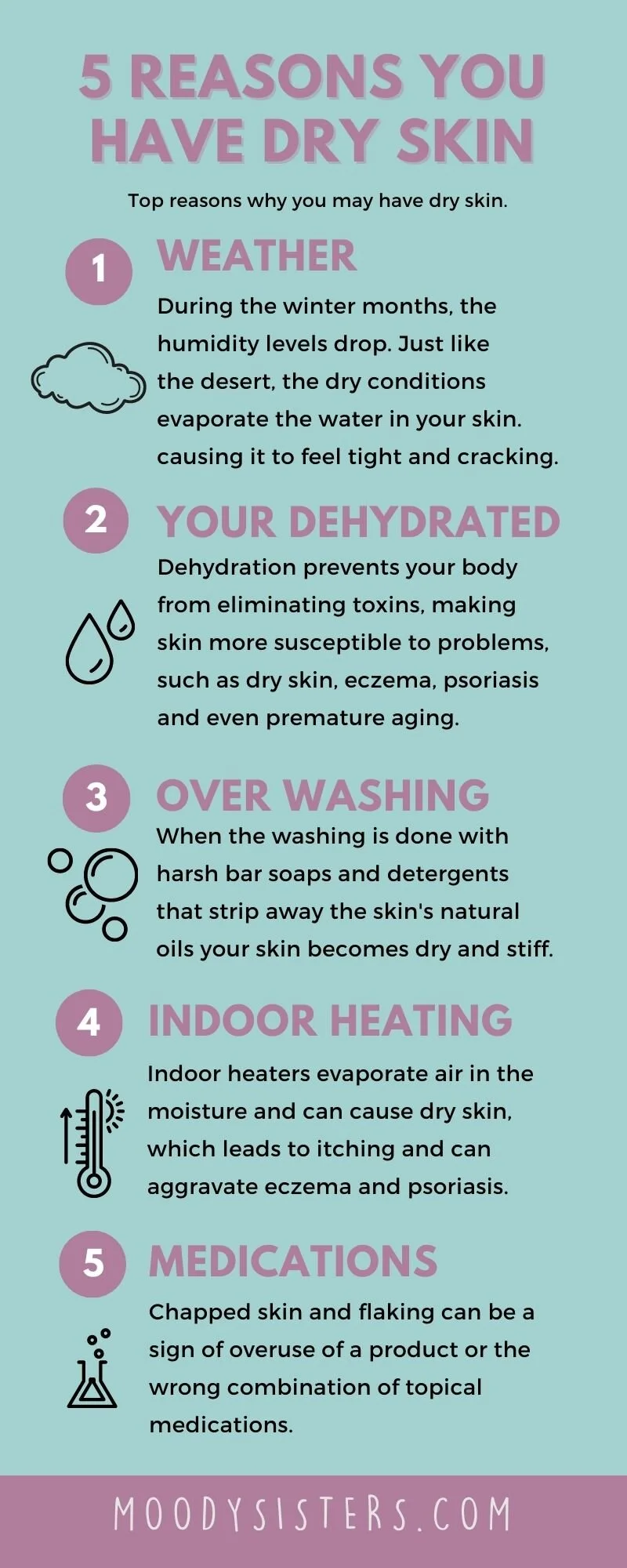Dry skin can be a common and bothersome issue that many people experience. There are several factors that can contribute to this frustrating condition. Environmental factors such as cold weather and low humidity levels can strip the skin of its natural moisture, leading to dryness. Additionally, excessive washing with hot water and harsh soaps can also contribute to dry skin by stripping away the protective oils. Certain medical conditions, such as eczema and psoriasis, can also cause dryness and irritation. Understanding the common factors that contribute to dry skin can help you identify potential triggers and find effective solutions to keep your skin hydrated and healthy.
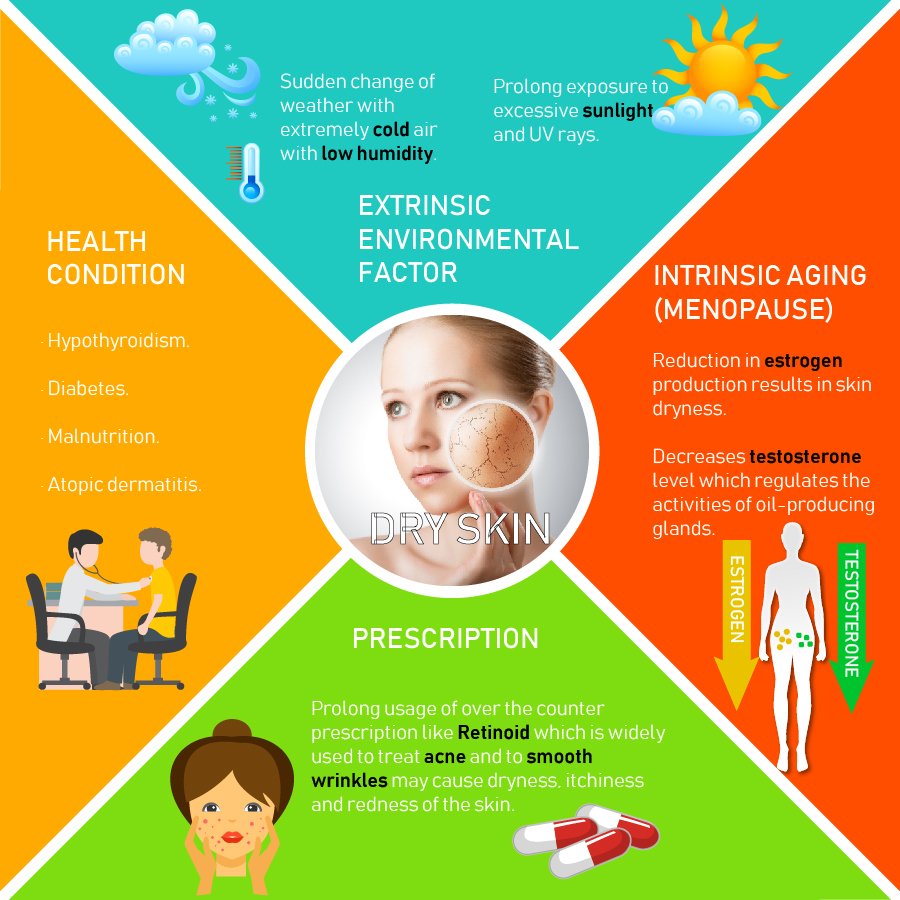
Environmental Factors
Low Humidity
Low humidity is a common environmental factor that can contribute to dry skin. When the air lacks moisture, it can cause the skin to become dry, tight, and flaky. This is because low humidity reduces the amount of moisture that the skin can absorb from the environment, leading to dehydration. To combat the effects of low humidity, it is important to keep your environment humidified, especially during dry winter months or in arid climates. Using a humidifier in your home or workplace can help add moisture to the air and prevent your skin from drying out.
Cold Weather
Cold weather can also be a culprit when it comes to dry skin. During the winter months, the air tends to be drier, and the cold temperatures can strip the skin of its natural oils, leading to dryness. Additionally, the frequent use of indoor heating systems can further exacerbate the problem by drying out the air indoors. To protect your skin during cold weather, it is recommended to wear protective clothing, such as hats and scarves, to cover exposed skin. Using a moisturizer that contains humectants, such as glycerin or hyaluronic acid, can also help lock in moisture and prevent dryness.
Hot Weather
While cold weather can cause dry skin, it may surprise you to learn that hot weather can also contribute to this issue. Excessive heat can deplete the skin’s natural moisture and cause it to become dry and itchy. This is especially true in dry climates or during summer months when the air is already lacking in humidity. To keep your skin hydrated during hot weather, it is important to drink plenty of water to stay hydrated from the inside out. Additionally, using a lightweight, oil-free moisturizer can help replenish any lost moisture on the skin’s surface.
Lifestyle Factors
Excessive Bathing
Bathing is an essential part of personal hygiene, but excessive bathing can actually contribute to dry skin. Frequent contact with water, especially if it is hot, can strip the skin of its natural oils and disrupt its moisture barrier. This can lead to dryness, irritation, and even skin conditions such as eczema. It is recommended to limit your bathing time to around 10-15 minutes and use lukewarm water instead of hot water. Also, avoid using harsh soaps or cleansers that can further dry out your skin. After bathing, pat your skin dry with a towel instead of rubbing it vigorously to minimize further damage.
Hot Showers
Similar to excessive bathing, taking hot showers can also contribute to dry skin. The hot water can strip away the natural oils on your skin, leaving it dry and prone to moisture loss. While hot showers may be relaxing, it is important to keep the water temperature moderate to prevent excessive drying. It is also beneficial to limit your shower time to avoid prolonged exposure to hot water. After showering, apply a moisturizer to help seal in the moisture and prevent your skin from becoming dry.
Harsh Soaps
Using harsh soaps or cleansers can be detrimental to your skin’s health, especially if you have dry skin. These products often contain ingredients that can disrupt the skin’s natural pH balance and strip away its moisture. Opt for mild, fragrance-free cleansers that are specifically formulated for dry or sensitive skin. Look for products that are labeled as gentle or moisturizing to ensure that they won’t further aggravate your dry skin.
Frequent Swimming
Swimming is a great form of exercise and relaxation, but frequent exposure to chlorinated pools or saltwater can be harsh on your skin. Chlorine and salt can strip away the skin’s natural oils, leaving it dry and irritated. If you enjoy swimming, make sure to rinse off with fresh water immediately after swimming to remove any residual chlorine or salt. Apply a moisturizer to your skin afterwards to replenish its moisture and keep it hydrated.
Medical Conditions
Eczema
Eczema, also known as atopic dermatitis, is a chronic skin condition that can cause dry, itchy, and inflamed skin. It is believed to be caused by a combination of genetic and environmental factors. People with eczema have a compromised skin barrier, which makes it more prone to moisture loss and irritants. If you have eczema, it is important to follow a gentle skincare routine and use moisturizers that are specifically formulated for sensitive skin. Avoiding triggers such as harsh soaps, fragrances, and extreme temperatures can also help manage your eczema and prevent further dryness.
Psoriasis
Psoriasis is an autoimmune condition that affects the skin cells, causing them to multiply rapidly and build up on the surface of the skin. This leads to thick, red, and scaly patches that can be itchy and painful. Dry skin is a common symptom of psoriasis, as the rapid cell turnover and inflammation disrupt the skin’s moisture balance. Moisturizing regularly with emollient-rich creams or ointments can help soothe and hydrate the skin. Additionally, medical treatments such as corticosteroids or retinoids may be prescribed by a healthcare professional to manage psoriasis and reduce dryness.
Hypothyroidism
Hypothyroidism is a condition in which the thyroid gland does not produce enough thyroid hormones. Dry skin is a common symptom of hypothyroidism, as the lack of these hormones can affect the skin’s ability to retain moisture. If you suspect that you have an underactive thyroid, it is important to seek medical advice for proper diagnosis and treatment. In addition to thyroid medication, maintaining a good skincare routine and using moisturizers can help alleviate the dryness associated with hypothyroidism.
Diabetes
People with diabetes often experience issues with their skin, including dryness. Diabetes can affect the blood vessels and nerves in the skin, reducing blood flow and impairing the skin’s ability to retain moisture. This can lead to dry, cracked skin, especially on the feet and hands. Proper blood sugar management is essential for overall skin health in individuals with diabetes. Additionally, regular moisturizing and foot care routines are recommended to prevent dry skin complications.
Sjogren’s Syndrome
Sjogren’s syndrome is an autoimmune disorder that primarily affects the salivary glands and tear ducts, leading to dry mouth and eyes. However, it can also cause dry skin throughout the body. The reduced production of saliva and tears in Sjogren’s syndrome can contribute to overall dryness, including the skin. Using moisturizers specifically designed for dry skin can help alleviate the discomfort associated with Sjogren’s syndrome. It is also important to stay hydrated by drinking plenty of water and avoiding caffeine and alcohol, as these can further contribute to dryness.
Aging
Loss of Skin Elasticity
As we age, our skin undergoes various changes, including a loss of elasticity. This loss of elasticity can lead to a decrease in the skin’s ability to retain moisture, resulting in dry skin. The production of collagen and elastin, which are responsible for maintaining skin elasticity, naturally decline over time. To combat this, it is important to incorporate a skincare routine that focuses on hydration and moisture. Look for products that contain ingredients like hyaluronic acid, ceramides, or peptides, as these can help improve skin elasticity and retain moisture.
Reduction in Sebum Production
Sebum is the natural oil produced by our skin’s sebaceous glands, and it plays a crucial role in keeping our skin moisturized. However, as we age, the production of sebum decreases. This reduction in sebum production can result in dry skin. To counteract this, it is important to incorporate moisturizers and skincare products that provide hydration and emollient properties. Look for products that contain ingredients like jojoba oil, shea butter, or squalane, as these can help replenish the skin’s natural oils and prevent dryness.
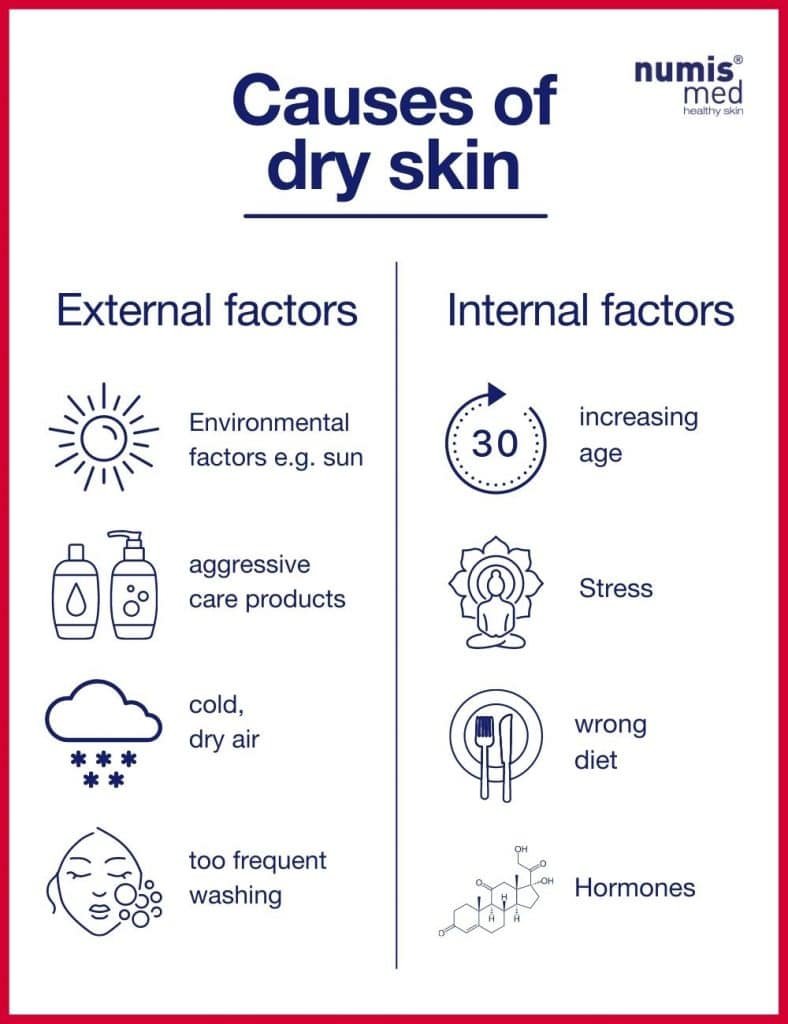
Genetic Predisposition
Family History
Your genetics can play a role in determining your skin type, including whether you are more prone to dry skin. If you have a family history of dry skin, there is a higher likelihood that you may also experience this condition. However, it is important to note that genetics alone do not guarantee dry skin. Environmental factors and lifestyle choices can also influence the overall health and hydration of your skin. Understanding your genetic predisposition can help guide your skincare routine and product choices to better manage dry skin.
Skin Sensitivity
Allergic Reactions
Some individuals have skin that is more sensitive and prone to allergic reactions. Allergens, such as certain fabrics, fragrances, or skincare ingredients, can trigger an immune response in sensitive individuals, leading to dryness, redness, and itchiness. It is important to identify and avoid potential allergens that may be causing your skin to become dry. Patch testing can be beneficial in determining the specific allergens that may be triggering your skin reactions. Opting for hypoallergenic and fragrance-free skincare products can also help minimize the risk of allergic reactions.
Irritants
In addition to allergens, certain irritants can also contribute to dry skin, even if you are not specifically allergic to them. Harsh chemicals, strong detergents, or abrasive substances can strip the skin of its natural oils and disrupt the moisture barrier. When choosing skincare products, opt for gentle, non-irritating formulations that are suitable for sensitive skin. Avoid using harsh exfoliants or aggressive cleansing techniques that can further aggravate your skin and cause dryness.
Fragrances
Fragrances are commonly used in many skincare and cosmetic products, but these can be irritating for individuals with dry skin or sensitive skin. Artificial fragrances often contain chemicals that can strip away the skin’s natural oils and cause dryness, redness, or even allergic reactions. If you have dry skin, it is advisable to choose fragrance-free or unscented products to minimize any potential irritation.
Dyes
Dyes, particularly synthetic dyes, can be harsh on the skin and exacerbate dryness. They are commonly found in certain skincare products, such as soaps, cleansers, or lotions, to provide color. However, these dyes can sometimes cause skin irritation or allergic reactions, leading to dryness and discomfort. Opting for products that are free from artificial dyes can help prevent any potential skin reactions and minimize dryness.
Preservatives
Preservatives are added to skincare products to prevent the growth of mold or bacteria. However, certain preservatives, such as parabens or formaldehyde-releasing agents, can be drying or irritating to the skin. If you have dry skin, it is best to look for products that use natural preservatives or are labeled as preservative-free. This can help minimize any potential drying or irritating effects on your skin.
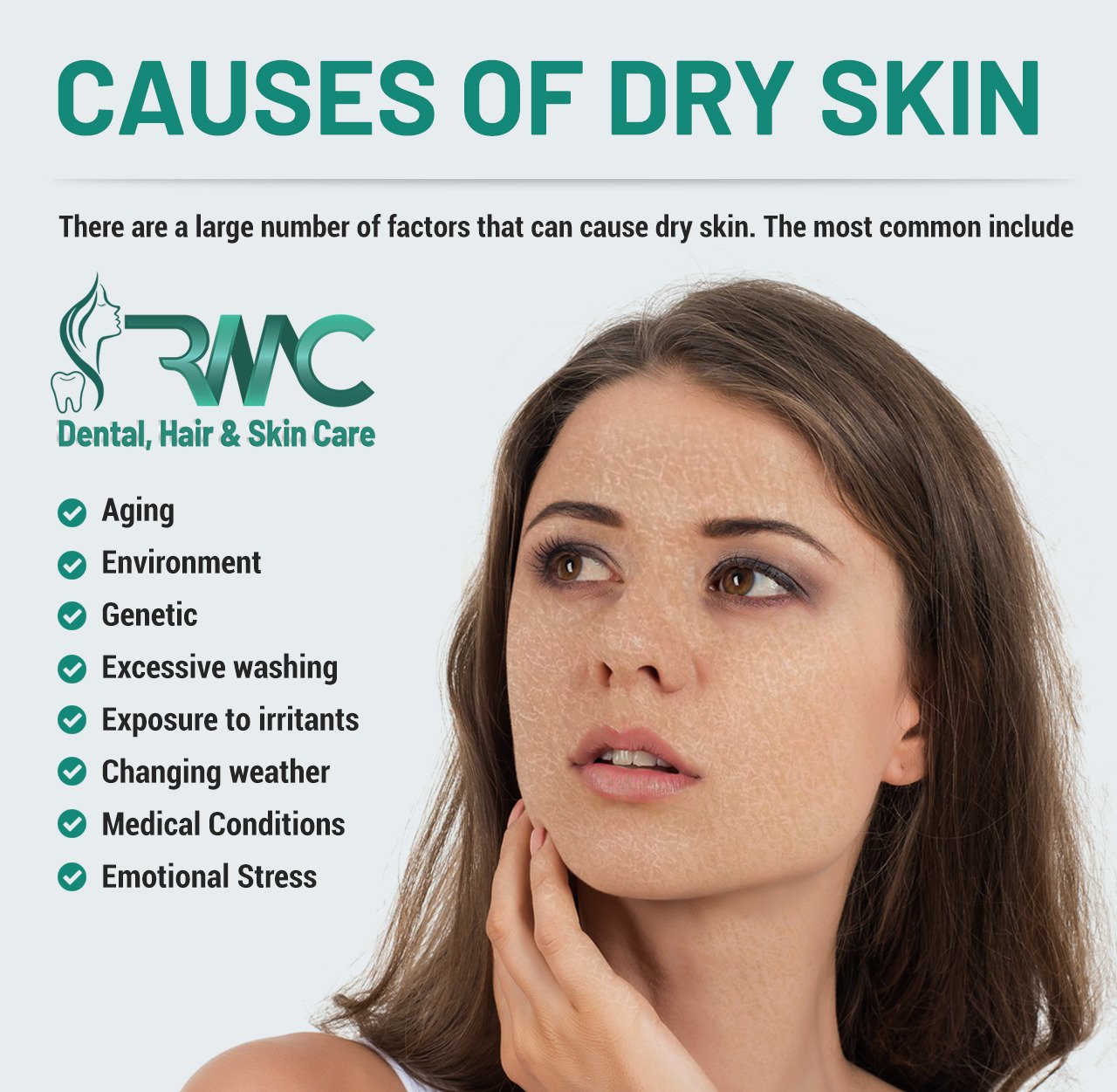
Harsh Skincare Products
Alcohol-Based Products
Alcohol is commonly found in skincare products, such as toners or astringents, due to its ability to remove excess oil and control shine. However, alcohol can be extremely drying for the skin, especially for those with already dry or sensitive skin. It strips away the natural oils on the skin’s surface, leading to increased dryness and potential irritation. If you have dry skin, it is best to avoid alcohol-based products and instead opt for alcohol-free alternatives that provide hydration and moisture.
Exfoliators
Exfoliators are designed to remove dead skin cells and reveal a smoother, brighter complexion. However, certain exfoliators, particularly those with rough or abrasive particles, can be too harsh for dry skin. Overusing or using harsh exfoliators can strip away the skin’s natural oils and disrupt its moisture balance, resulting in dryness and irritation. Instead, opt for gentle exfoliators that contain ingredients like fruit enzymes or polyhydroxy acids, as these are less likely to cause excessive dryness or irritation.
Acne Treatments
Acne treatments, such as benzoyl peroxide or salicylic acid, are often formulated to target excess oil production and acne-causing bacteria. However, these ingredients can also cause dryness, especially if used excessively or on dry skin. It is important to follow the recommended usage instructions and start with a lower concentration to minimize any potential dryness or irritation. Additionally, incorporating a hydrating moisturizer into your skincare routine can help counteract any dryness caused by acne treatments.
Overwashing
Excessive Cleansing
Cleansing is an important step in any skincare routine, but excessive cleansing can strip the skin of its natural oils and disrupt its moisture barrier. Overwashing can lead to dryness, tightness, and even increased oil production as the skin tries to compensate for the loss of moisture. It is recommended to cleanse your face no more than twice a day, using a gentle cleanser that is suitable for your skin type. Avoid using hot water and harsh rubbing motions, as these can further dry out your skin.
Using Hot Water
Using hot water when washing your face or body can be tempting, especially during colder months. However, hot water can be harsh on your skin and cause it to become dry and irritated. The heat can strip away the natural oils, leading to increased dryness and even discomfort. It is best to use lukewarm water when cleansing your skin to ensure that you don’t excessively strip away its moisture. After washing, gently pat your skin dry with a soft towel to minimize any further damage.
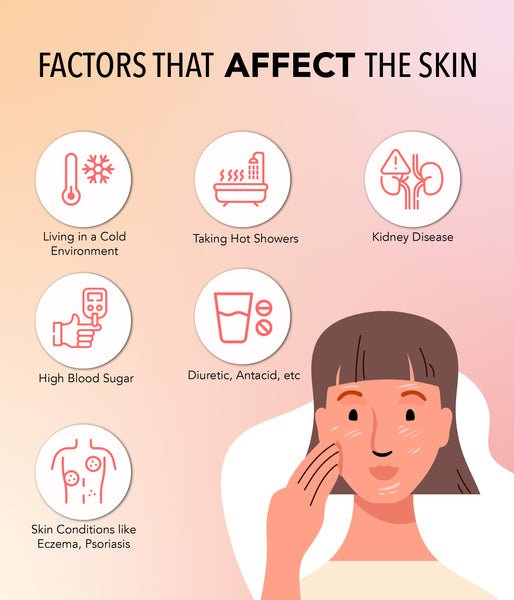
Underlying Health Conditions
Dehydration
Dehydration occurs when your body does not have enough water to function properly. This can also affect your skin, leading to dryness, flakiness, and a lack of elasticity. It is important to stay hydrated by drinking enough water throughout the day to prevent dehydration not only for your overall health but also for the health of your skin. Aim to drink at least 8 cups of water per day and increase your intake if you engage in physical activity or spend time in a dry or hot environment.
Malnutrition
Poor nutrition can also contribute to dry skin. Essential vitamins and minerals, such as vitamin E, vitamin C, omega-3 fatty acids, and zinc, play a crucial role in maintaining healthy skin. A lack of these nutrients can lead to dryness, dullness, and other skin issues. Eating a well-balanced diet that includes a variety of fruits, vegetables, whole grains, and lean proteins can help provide the necessary nutrients for healthy skin. If you suspect that you have a nutritional deficiency, it is advisable to consult with a healthcare professional for proper diagnosis and guidance.
Kidney Disease
Kidney disease can impact the body’s ability to eliminate waste and maintain fluid balance, leading to dry skin as a result of dehydration. Additionally, the buildup of toxins in the body can affect the overall health and appearance of the skin. Managing kidney disease through medical treatment, proper hydration, and following a kidney-friendly diet can help minimize dryness and promote overall skin health. It is important to work closely with a healthcare professional and follow their recommendations for managing kidney disease.
Liver Disease
Liver disease can also contribute to dry skin due to its impact on the body’s ability to properly function. Since the liver plays a crucial role in eliminating toxins and producing bile, its dysfunction can affect various body processes, including skin health. The buildup of toxins can lead to dryness, itchiness, and even yellowing of the skin. Treating liver disease and maintaining liver health through medical interventions and lifestyle modifications can help improve dry skin symptoms. It is important to consult with a healthcare professional for proper diagnosis and management of liver disease.
Medications
Diuretics
Diuretics are medications commonly prescribed to increase urine production and promote the elimination of excess fluid from the body. While diuretics can be beneficial for managing conditions such as high blood pressure or heart failure, they can also contribute to dry skin as a side effect. The increased urine production can lead to dehydration, which can manifest as dry skin. If you are taking diuretics and experiencing dry skin, it is important to stay hydrated by drinking plenty of water and moisturizing regularly to minimize dryness.
Antihistamines
Antihistamines are often used to relieve symptoms of allergies, such as itching, sneezing, or runny nose. However, some antihistamines can have drying effects on your skin, as they can reduce the production of sweat and oil. This can result in dryness and even exacerbate existing dry skin conditions. If you are taking antihistamines and experiencing dry skin, it is recommended to moisturize regularly and drink enough water to stay hydrated.
Retinoids
Retinoids are a class of medications commonly used to treat acne, as well as signs of aging. While retinoids can be effective in addressing these concerns, they can also cause dryness and irritation, especially during the initial stages of use. This is because retinoids increase skin cell turnover, which can lead to increased dryness before the skin adapts to the treatment. If you are using retinoids and experiencing dry skin, it is important to follow a hydrating skincare routine, use moisturizers that are suitable for your skin type, and consult with a healthcare professional for guidance on the proper use of retinoids.
In conclusion, dry skin can be caused by a variety of factors, including environmental influences, lifestyle choices, medical conditions, aging, genetic predisposition, skin sensitivity, harsh skincare products, overwashing, underlying health conditions, and certain medications. By understanding the different factors that contribute to dry skin, you can take proactive steps to prevent and manage this common skin concern. It is important to establish a skincare routine that focuses on hydration, avoid harsh products or excessive cleansing, and seek medical advice if dryness persists or becomes severe. By prioritizing your skin’s health and moisture balance, you can promote smoother, softer, and more supple skin.
